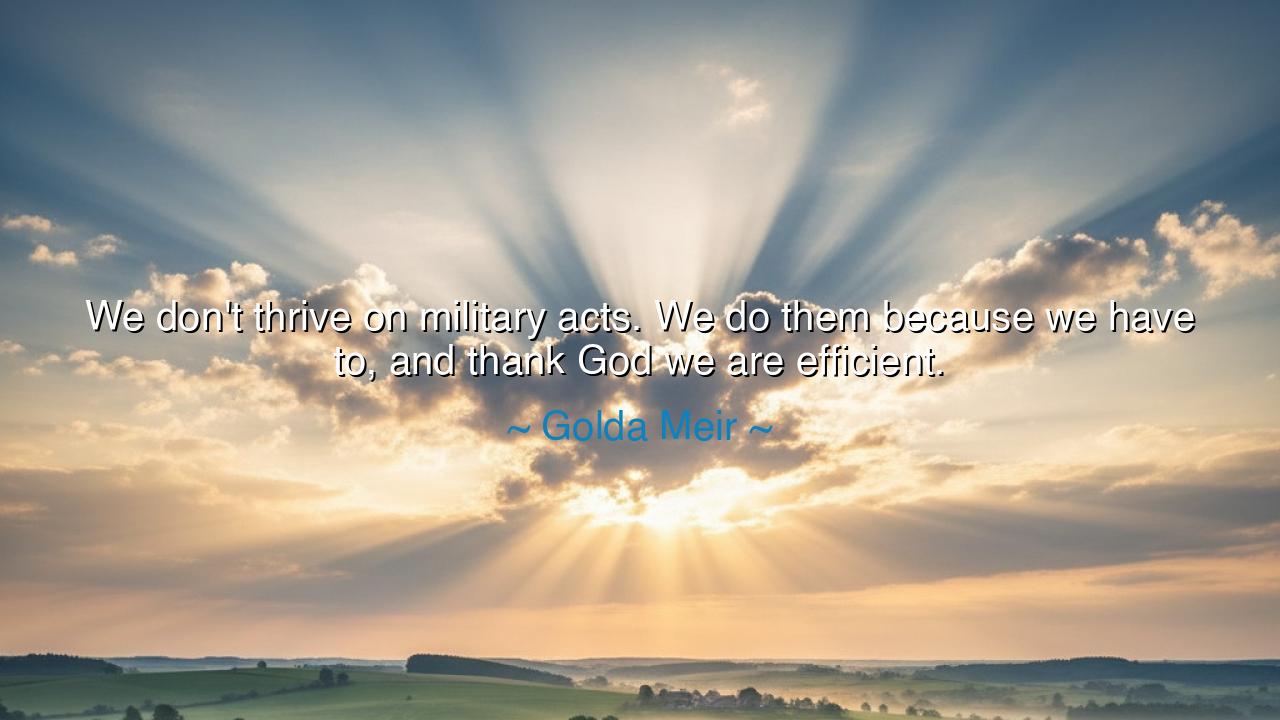
We don't thrive on military acts. We do them because we have to
We don't thrive on military acts. We do them because we have to, and thank God we are efficient.






“We don’t thrive on military acts. We do them because we have to, and thank God we are efficient.” — so spoke Golda Meir, the Iron Lady of Israel, whose words carry both the sorrow of necessity and the dignity of survival. Her voice is not that of a conqueror seeking glory, but of a guardian defending life. In her declaration lies the eternal truth of a nation forged in struggle — a people who did not choose the sword, but took it up because the world left them no choice. Hers is the language of reluctant strength, of duty carried not for pride, but for peace.
To thrive on military acts would be to love war, to find meaning in destruction. But Golda Meir, who led her people through storms of fire, understood that war is not a triumph but a tragedy — a burden laid upon those who wish to live free among enemies who would see them erased. She speaks not of aggression, but of defense; not of ambition, but of survival. “We do them because we have to,” she says — and in those words burns the quiet resolve of a people who have learned that sometimes, to preserve peace, one must first endure the cruelty of battle.
The history behind her words is written in dust and blood. Born in Kiev, raised in poverty, and hardened by exile, Golda Meir rose to become the Prime Minister of a nation surrounded by foes. When the Yom Kippur War erupted in 1973, Israel was attacked on its holiest day. The surprise assault shook the nation’s heart. Mothers sent their sons to the front, knowing some would not return. Golda, burdened with impossible choices, ordered the defense — not out of hatred, but out of love for her people’s right to exist. And when the guns finally fell silent, she wept, for victory bought with blood is no victory at all.
Her words — “thank God we are efficient” — reveal another layer of truth. She did not boast of power; she gave thanks for the discipline and unity that preserved her nation’s life. Efficiency, in her tongue, meant readiness, wisdom, courage — not joy in violence, but mastery of necessity. For what is efficiency, if not the strength to act swiftly when hesitation means death? Yet beneath that efficiency lay the heart of a mother who longed for peace, who yearned for a world where children could grow without the shadow of war.
In this, Golda Meir speaks not only for Israel, but for all who have had to fight for survival — for every nation, every soul forced to defend what it loves. Her words remind us that war, though sometimes unavoidable, is never noble in itself. The true nobility lies in restraint, in the sorrow that accompanies every victory. The warrior who fights without hatred, who mourns even his enemy, stands closest to righteousness. The ancients understood this well: the greatest generals were not those who loved war, but those who despised it most, yet fought it best.
Remember the story of Cincinnatus, the Roman farmer. When Rome was threatened, he was called from his plow to lead the legions. He won the war swiftly, and when the danger passed, he returned to his field, refusing power. Like Golda, he did not thrive on military acts — he did them because he had to. His greatness lay not in conquest, but in humility. Such is the way of the just defender: to fight only when there is no other path, and to lay down the sword the moment peace returns.
Thus, my child, take this lesson to heart: strength is not in loving the fight, but in standing ready when duty calls. Let not the spirit rejoice in victory, but in the peace that follows it. If ever you are forced to act — whether in defense of your home, your honor, or your ideals — do so with clarity and compassion, not rage. Be efficient in purpose, steadfast in heart, and merciful in triumph. For those who wield power without delight, who act only to protect and not to destroy, are the true peacemakers of the world.
And so, remember the wisdom of Golda Meir: that necessity may drive us to hard deeds, but gratitude and humility must guide our hearts. We do not thrive on battle, for the soul was not made for war. But when the storm rises and peace must be defended, may we act with courage — and may we, when it is done, return to the quiet fields of life, and thank God once more.






AAdministratorAdministrator
Welcome, honored guests. Please leave a comment, we will respond soon